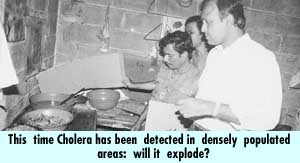 |
 22nd November 1998 |
Front Page| |
Cholera comes to Colombo* How you can
get it City eating houses are sealed as the deadly disease spreads. Faraza Farook and Nilika de Silva report. Colombo, Lanka's most populous city has already buried four victims of cholera. Hitherto known only in locations where the density of population was so low that the germ could be contained easily, this time around the cholera virus has thrown the health authorities into a panic, as the deadly disease spreads in the city. While 430 cases were reported last year, this year's reports upto November showed a dramatic three fold increase. Even the deaths reported showed a similar rise.
According to Deputy Chief Medical Officer of Health Dr. Pradeep Kariyawasm 38 cases out of the suspected 92 have been diagnosed positive in Colombo and the suburbs. Public Health Inspectors (PHI) are expected to visit eating houses at least once a week, but when The Sunday Times spoke to some of the eating houses they said that the PHIs visit only once a month or so. Presently there are 28 PHIs in Colombo, although 48 positions exist. Although there are trainee PHIs helping to overcome the situation, there seems to be a shortfall in the number of cadres. Dr. Kariyawasam says they have started to superchlorinate the water and also close down tube wells in hotels. Although hotels in Colombo are not supposed to have tube wells, most of the smaller hotels do. When the PHIs make inspection visits, these wells are all closed and the employees maintain that they don't use them any more. At least 24 eating houses have been closed down in the Colombo Municipality according to the Provincial Director of Health Services Dr. Nihal Jayatilleke. "These eating houses are closed only for a short period, until they maintain the standards, and then are allowed to open again." Cholera is an acute infection involving the lower part of the small bowel. It is caused by a short, curved red shaped germ which produces a powerful poison or endotoxine. The disease is mostly spread by contaminated food or water and by faeces and flies. There are two strains of cholera, namely Cholera Vibrio and Cholera El Tor Ogawa. Speaking of the symptoms commonly seen in cholera, G.P Dr. S.O. Wijesinghe said patients with cholera may initially have an abdominal pain with gradual onset of fever or mild diarrhoea followed by low grade temperature. This can turn to sudden violent purging. The stools are loose, watery and greyish brown in colour. Sometimes nausea and vomiting accompanies diarrhoea. All this sudden loss of fluid causes severe dehydration and this results in death. Dr. Wijesinghe stressed that contact history is very important in treating the patient, e.g if the patient has come into close contact with a carrier of the disease. "Children and elderly people would be particularly vulnerable to the disease because their immunity is low." Other signs to look out for are a feeling of oppression and pain in the lower abdomen followed by muscle spasm like heat cramps, the patient beginning to suffer from intense thirst, the tongue becoming white and dry, the skin becoming wrinkled, the eyeballs sunken, cheeks hollow and breathing growing somewhat laboured and difficult. Because of the lack of fluids in the body, the blood pressure falls and the temperature may be even subnormal. Unless the fluid is quickly replaced, death may result from collapse of the circulation. With proper treatment the patient usually begins to recover about the third day of the illness. A correct diagnosis is most important in cholera, for its treatment is different from that of other conditions it may resemble. Uncooked food and particularly fruits and vegetables, specially if washed in contaminated water, or human excreta used as a fertilizer for soil are leading causes in spreading the infection. Flies feeding on excreta may directly transfer the germs to the food. The disease may spread from person to person by way of direct contact. The infected person remains a danger to others until the organisms disappear from the stools, usually in 7-14 days. The patient must be isolated during the infectious period and contacts must be examined daily. All things which come in contact with the patient must be disinfected immediately. |
||
 |
More Plus * The man behind the Mahapola
Front Page| News/Comment| Editorial/Opinion| Business| Sports | Mirror Magazine |
|
 |
Please send your comments and suggestions on this web site to |
|
 Health
authorities say the monsoonal rains are the cause for the outbreak. Compared
to the previous year there is an upsurge in the spread of cholera. Early
this year there was an outbreak in the Polonnaruwa-Dambulla districts and
many pilgrims were affected. The disease particularly tends to follow the
movements of masses of people such as pilgrims, so special precautions
must be taken on the occasion of widely attended religious festivals.
Health
authorities say the monsoonal rains are the cause for the outbreak. Compared
to the previous year there is an upsurge in the spread of cholera. Early
this year there was an outbreak in the Polonnaruwa-Dambulla districts and
many pilgrims were affected. The disease particularly tends to follow the
movements of masses of people such as pilgrims, so special precautions
must be taken on the occasion of widely attended religious festivals.